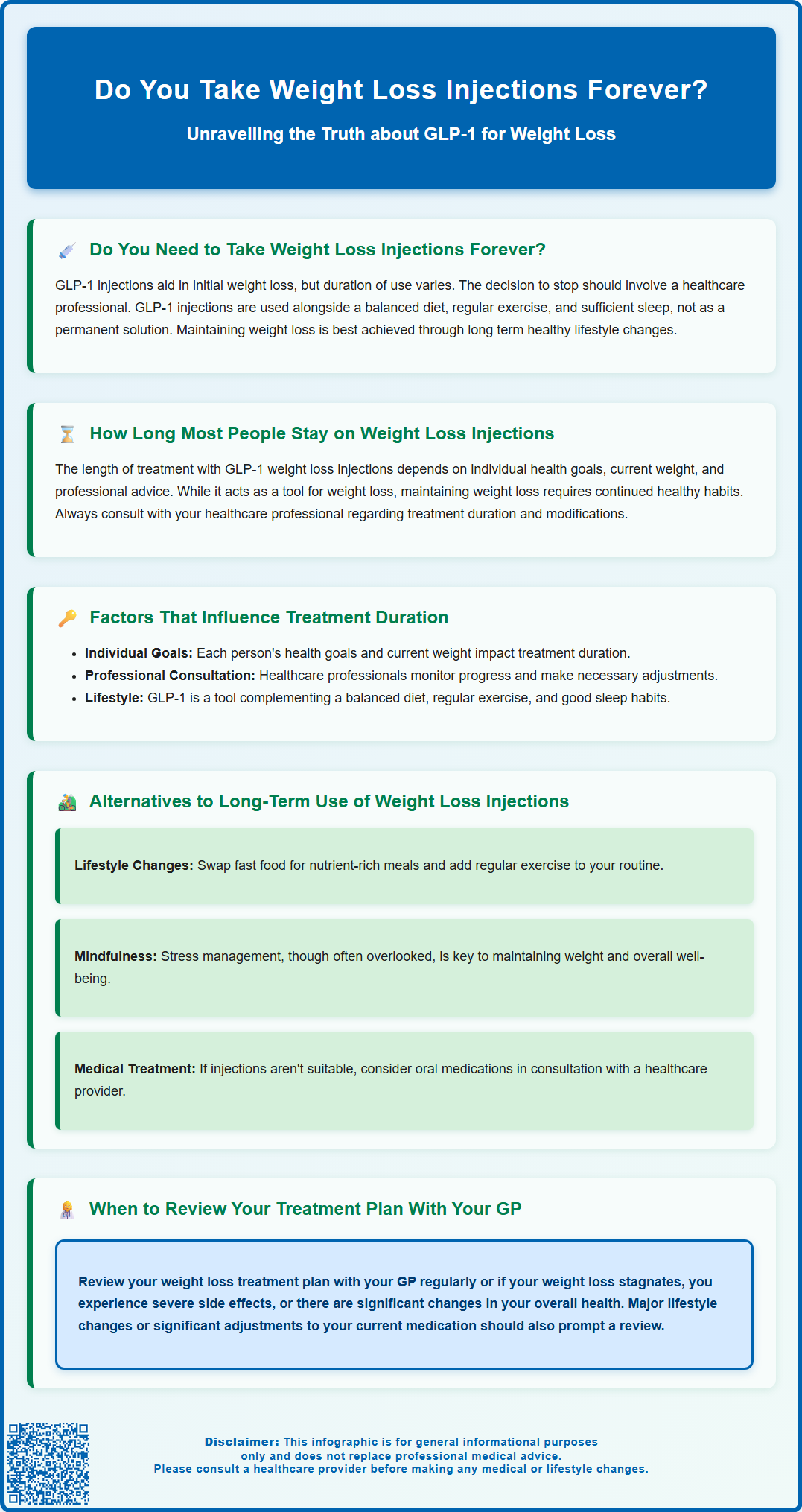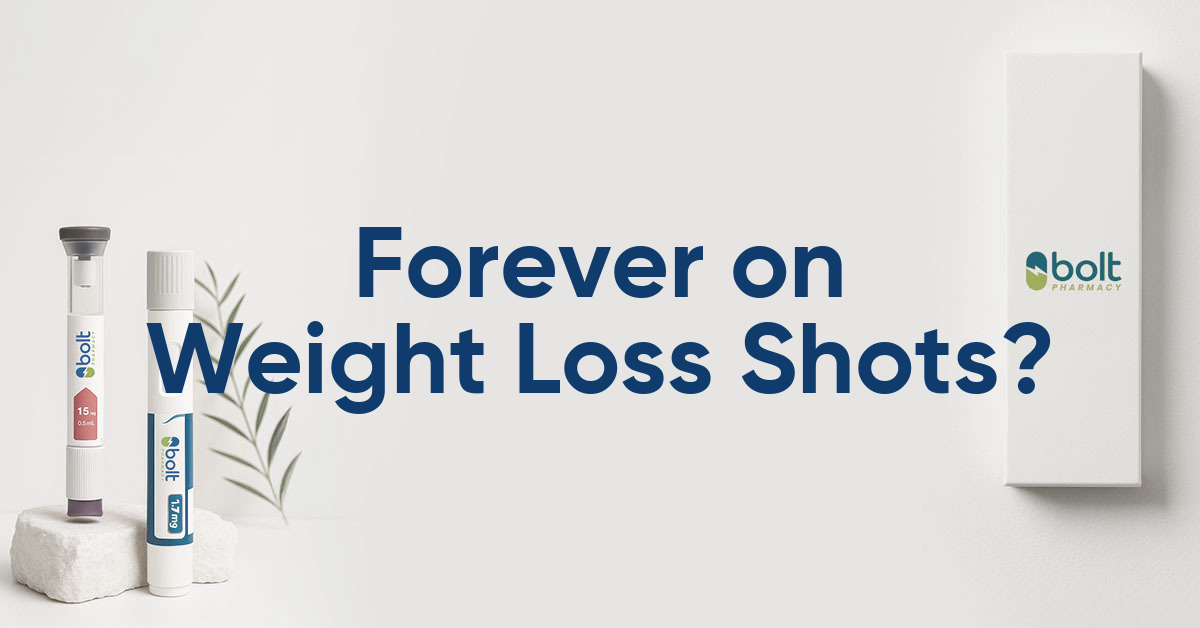Weight loss injections such as semaglutide (Wegovy) and liraglutide (Saxenda) are increasingly prescribed for obesity management, but many patients wonder: do you take weight loss injections forever? These GLP-1 receptor agonists are designed as long-term treatments rather than quick fixes, with clinical trials demonstrating efficacy over periods of 68 weeks to two years or more. However, NHS guidance recommends semaglutide for a maximum of two years within specialist services, and treatment duration varies based on individual response, tolerability, and clinical need. Understanding the intended duration, what happens after stopping, and strategies for maintaining weight loss is essential for anyone considering or currently using these medications.
Summary: Weight loss injections are not taken forever; they are typically used for 1-2 years as part of long-term weight management, with NHS guidance recommending semaglutide for a maximum of 2 years in specialist services.
- GLP-1 receptor agonists like semaglutide and liraglutide work by reducing appetite, slowing gastric emptying, and modifying brain reward pathways.
- Clinical trials demonstrate efficacy over 68 weeks to 2+ years, with progressive weight loss throughout treatment duration.
- Most patients regain approximately two-thirds of lost weight within a year of stopping treatment due to physiological appetite regulation returning to baseline.
- NHS eligibility requires BMI ≥35 kg/m² with comorbidity (or ≥30 kg/m² in exceptional circumstances) and documented unsuccessful lifestyle modification attempts.
- Treatment should be discontinued if patients lose less than 5% initial body weight after 12 weeks at maintenance dose.
- Regular monitoring of weight, blood pressure, metabolic parameters, and potential complications like pancreatitis or gallbladder disease is essential throughout treatment.
Table of Contents
How Long Do Weight Loss Injections Need to Be Taken?
Weight loss injections, primarily glucagon-like peptide-1 (GLP-1) receptor agonists such as semaglutide (Wegovy) and liraglutide (Saxenda), are not typically intended as short-term interventions. Current evidence and prescribing guidance suggest these medications work most effectively when used as part of a long-term weight management strategy rather than a brief course of treatment. The duration of therapy varies considerably between individuals and depends on multiple clinical factors including treatment response, tolerability, and overall health goals.
In clinical trials that established the efficacy of these agents, participants typically used the medications for periods ranging from 68 weeks to over two years. During the STEP trials for semaglutide, for instance, participants continued treatment for 68 weeks, demonstrating progressive weight loss throughout this period. In clinical practice, treatment duration is guided by both clinical response and commissioning frameworks.
While the MHRA-approved product information (SmPCs) for these medications does not specify a maximum treatment duration, NICE Technology Appraisal (TA664) recommends semaglutide for a maximum of 2 years within specialist weight management services in the NHS. Treatment should be reviewed regularly with specific stopping rules for each medication. For liraglutide, treatment should be discontinued if patients have not lost at least 5% of their initial body weight after 12 weeks on the 3mg daily dose. For semaglutide, similar efficacy assessment should occur after reaching the maintenance dose as specified in the SmPC. Tirzepatide, a newer GLP-1/GIP dual agonist, has also received UK approval for weight management with similar NHS commissioning constraints. The decision regarding treatment duration should always be individualised, taking into account the patient's response, comorbidities, and the balance of benefits against potential risks and costs.
What Happens When You Stop Weight Loss Injections?
Discontinuation of weight loss injections typically results in weight regain for most individuals, though the extent and rapidity vary considerably. Clinical trial data consistently demonstrate that when GLP-1 receptor agonists are stopped, patients tend to regain a substantial proportion of the weight they lost during treatment. In the STEP 1 extension trial, participants who discontinued semaglutide after 68 weeks regained approximately two-thirds of their lost weight within the following year, whilst those who continued treatment maintained their weight loss. Similarly, the STEP 4 trial demonstrated the importance of continued therapy for weight maintenance.
The physiological explanation for this rebound relates to how these medications work. GLP-1 receptor agonists reduce appetite, slow gastric emptying, and modify food reward pathways in the brain. When the medication is withdrawn, these effects cease, and the body's natural appetite regulation returns to its pre-treatment state. Additionally, weight loss itself triggers compensatory metabolic adaptations—including reduced energy expenditure and increased hunger signals—that persist after treatment stops, making weight regain biologically driven rather than simply a matter of willpower.
Beyond weight regain, metabolic improvements associated with weight loss, such as better glycaemic control and reduced blood pressure, may also deteriorate as weight returns. Patients with type 2 diabetes should liaise with their healthcare team about glycaemic monitoring and potential adjustments to diabetes medications when stopping GLP-1 therapy. It is worth noting that not everyone regains all lost weight; individuals who have successfully implemented sustainable lifestyle changes during treatment may maintain some degree of weight loss, though evidence suggests this represents a minority of cases. Patients considering stopping treatment should discuss the implications with their prescriber and develop a structured plan for ongoing weight management support.

Factors That Determine Treatment Duration
Multiple clinical and individual factors influence how long a patient might remain on weight loss injection therapy. Treatment response is paramount—patients who achieve meaningful weight loss (generally defined as at least 5% of initial body weight) and experience improvements in obesity-related comorbidities are more likely to continue treatment. Conversely, inadequate response after an appropriate trial period typically prompts discontinuation. The presence and severity of weight-related complications such as type 2 diabetes, obstructive sleep apnoea, or cardiovascular disease may justify longer treatment durations, as the benefits of sustained weight loss extend beyond cosmetic considerations to meaningful health improvements.
Tolerability significantly affects treatment duration. Whilst gastrointestinal side effects such as nausea, vomiting, and diarrhoea are common, particularly during dose escalation, these typically improve over time. However, persistent or severe adverse effects may necessitate dose reduction or discontinuation. Patients should be advised that severe, persistent abdominal pain (with or without vomiting) warrants urgent medical assessment and drug cessation pending review, as this could indicate pancreatitis or gallbladder disease, which are rare but serious complications.
Safety considerations include several important precautions. These medications are contraindicated during pregnancy and breastfeeding; semaglutide should be discontinued at least 2 months before a planned pregnancy. Patients with diabetes should be monitored for diabetic retinopathy progression, particularly if glycaemic control improves rapidly. There is also a risk of acute kidney injury with dehydration, and patients taking insulin or sulfonylureas may experience hypoglycaemia requiring dose adjustments of these medications.
Practical factors including cost and access influence treatment duration considerably. In the NHS, weight loss injections are available only under specific criteria, and funding limitations restrict treatment length. Private prescriptions can cost several hundred pounds monthly, making long-term use financially prohibitive for many. Additionally, medication supply issues have affected availability, with NHS England issuing guidance to prioritise patients with type 2 diabetes during shortages. Regular clinical review ensures that continuation remains appropriate, balancing ongoing benefits against cumulative risks, costs, and the patient's evolving needs and preferences.
Long-Term Weight Management After Stopping Injections
Successfully maintaining weight loss after discontinuing weight loss injections requires a comprehensive, structured approach to lifestyle modification. Evidence suggests that patients who engage actively in behavioural weight management programmes during their treatment period achieve better long-term outcomes. These programmes typically address dietary patterns, physical activity, sleep hygiene, and psychological factors that influence eating behaviours. Establishing sustainable habits whilst on medication—rather than relying solely on the appetite-suppressing effects—provides a foundation for weight maintenance after cessation.
Dietary strategies for post-treatment weight management should focus on nutrient-dense, lower-energy foods that promote satiety without excessive caloric intake. Protein intake is particularly important, as higher protein diets help preserve lean muscle mass during weight loss and may reduce subsequent weight regain. Regular meal patterns, mindful eating practices, and strategies to manage emotional eating all contribute to long-term success. Many patients benefit from ongoing support from dietitians who can provide personalised guidance and help troubleshoot challenges as they arise.
Physical activity plays a crucial role in weight maintenance. The UK Chief Medical Officers' Physical Activity Guidelines recommend at least 150 minutes of moderate-intensity activity weekly for general health, but evidence suggests that individuals who maintain significant weight loss typically engage in more—often 200-300 minutes weekly. Both aerobic exercise and resistance training are valuable, with resistance training particularly important for maintaining metabolic rate by preserving muscle mass. Beyond structured exercise, increasing general daily activity through active transportation and reducing sedentary time contributes to energy balance.
Ongoing monitoring and support significantly improve outcomes. Regular weight checks allow early detection of regain, enabling prompt intervention before substantial weight returns. The NHS offers a tiered weight management pathway, with Tier 2 community services, Tier 3 specialist multidisciplinary services, and Tier 4 bariatric surgery. Some patients may benefit from continued involvement with these services, support groups, or the NHS Digital Weight Management Programme. Psychological support, including cognitive behavioural therapy approaches, can address underlying behaviours and thought patterns that contributed to weight gain initially. In some cases, bariatric surgery may be appropriate if significant regain occurs despite optimal lifestyle measures, with eligibility criteria outlined in NICE Clinical Guideline 189.
NHS Guidance on Weight Loss Injection Treatment Length
NHS England guidance on weight loss injections, specifically GLP-1 receptor agonists for weight management, emphasises that these medications should be prescribed as part of a specialist weight management service rather than in isolation. According to NICE Technology Appraisal 664, NHS eligibility for semaglutide is restricted to individuals with a body mass index (BMI) of 35 kg/m² or above with at least one weight-related comorbidity, or in exceptional circumstances, those with a BMI of 30-34.9 kg/m² with a weight-related comorbidity. For people of Black, Asian and other minority ethnic groups, the BMI thresholds should be adjusted accordingly, with lower thresholds for intervention as recommended by NICE. Treatment is typically initiated only after documented evidence of unsuccessful weight loss attempts through lifestyle modification alone.
NICE guidance recommends regular review of treatment efficacy and appropriateness. Specifically, treatment should be continued beyond the initial trial period only if the patient has lost at least 5% of their initial body weight after reaching the maintenance dose (12 weeks at 3mg daily for liraglutide; appropriate duration on maintenance dose for semaglutide as per SmPC). This threshold ensures that NHS resources are directed toward patients who demonstrate meaningful response. Importantly, NICE TA664 recommends semaglutide for a maximum of 2 years within specialist weight management services, reflecting a defined NHS funding period rather than a safety limitation.
NHS prescribing of weight loss injections occurs within a framework of resource constraints and prioritisation. Local integrated care boards may have additional restrictions on treatment duration or may limit prescribing to specific patient groups. The recent supply challenges with semaglutide have further complicated access, with NHS England issuing guidance to prioritise patients with type 2 diabetes. Patients prescribed these medications through the NHS should expect ongoing monitoring including assessment of weight, blood pressure, and relevant metabolic parameters, alongside continued engagement with lifestyle modification programmes. Decisions about treatment duration should be made collaboratively between patient and prescriber, considering individual circumstances, treatment response, and the evolving evidence base regarding long-term safety and efficacy of these agents.
Scientific References
Frequently Asked Questions
How long should I stay on weight loss injections?
Treatment duration varies individually, but clinical trials typically span 68 weeks to over 2 years. NHS guidance recommends semaglutide for a maximum of 2 years within specialist weight management services, with regular reviews to assess ongoing efficacy and appropriateness.
Will I regain weight after stopping weight loss injections?
Most patients regain a substantial proportion of lost weight after stopping, with clinical trials showing approximately two-thirds of weight regained within a year. This occurs because appetite regulation returns to pre-treatment levels and metabolic adaptations persist after weight loss.
Can I get weight loss injections on the NHS long-term?
NHS access is restricted to specialist weight management services for patients meeting specific BMI and comorbidity criteria. NICE recommends semaglutide for a maximum of 2 years, with treatment continued only if patients lose at least 5% of initial body weight after reaching maintenance dose.
The health-related content published on this site is based on credible scientific sources and is periodically reviewed to ensure accuracy and relevance. Although we aim to reflect the most current medical knowledge, the material is meant for general education and awareness only.
The information on this site is not a substitute for professional medical advice. For any health concerns, please speak with a qualified medical professional. By using this information, you acknowledge responsibility for any decisions made and understand we are not liable for any consequences that may result.
Heading 1
Heading 2
Heading 3
Heading 4
Heading 5
Heading 6
Lorem ipsum dolor sit amet, consectetur adipiscing elit, sed do eiusmod tempor incididunt ut labore et dolore magna aliqua. Ut enim ad minim veniam, quis nostrud exercitation ullamco laboris nisi ut aliquip ex ea commodo consequat. Duis aute irure dolor in reprehenderit in voluptate velit esse cillum dolore eu fugiat nulla pariatur.
Block quote
Ordered list
- Item 1
- Item 2
- Item 3
Unordered list
- Item A
- Item B
- Item C
Bold text
Emphasis
Superscript
Subscript












